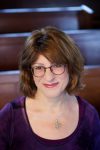Rabbi Susan Shamash began a fellowship with Rabbis Without Borders this month. (photo from Susan Shamash)
“Rabbis Without Borders addresses borders within Judaism,” said Rabbi Susan Shamash, one of two Canadian rabbis who began a fellowship with Rabbis Without Borders (RWB) this month. “The fellowship aims to span denominations and to break down barriers between rabbis of different denominations, so that they can cross the borders and collaborate.”
While at a Shabbaton led by RWB when she was a rabbinical student, Shamash became interested in the Clal fellowship. Established in 1974 by Rabbi Irving Greenberg and Elie Wiesel, Clal’s “mission has been to help prepare the Jewish people for the unprecedented freedom and openness of North America,” notes the announcement of Shamash’s acceptance into the competitive program, which began in 2008.
Shamash told the Independent that RWB tries to develop rabbis who are able to think and work outside the box while working inside specific communities. Although based in the United States, Clal welcomes Canadian rabbis to its fellowship and, this year, Rabbi Denise Handlarski of Toronto’s Oraynu, a secular humanist congregation, was also accepted.
Shamash completed her rabbinical training in January 2017, obtaining semichah (ordination) from Aleph: Alliance for Jewish Renewal, after a decades-long career as an administrative law judge. Shamash received semichah with four others at that year’s Ohalah conference in Boulder, Colo., from a large number of rabbis, 10 of whom signed her certificate. Her training was overseen, as are all Aleph rabbinic trainings, by a committee of three. In her case, it was Rabbi Victor Gross, Rabbi Hanna Tiferet Siegel (one of the founders of Vancouver’s Or Shalom) and Rabbi Laura Duhan Kaplan (formerly spiritual leader of Or Shalom, now on the faculty of Vancouver School of Theology).
Shamash has been involved with Or Shalom since it started and counts the founding teachers, Siegel and her husband Daniel, among her mentors, as well as Duhan Kaplan, who is delighted to have her aboard. “As a longtime member of the RWB network, I’m delighted that Rabbi Susan Shamash will join us,” Duhan Kaplan told the Independent. “We need more Canadian voices like Rabbi Susan, willing to creatively address emerging issues in our religious and cultural life.”
“I am excited to join Rabbi Laura Duhan Kaplan and [Or Shalom] Rabbi Hannah Dresner in bringing the deep wisdom of this fellowship to Metropolitan Vancouver,” said Shamash.
“I went into law school because I needed a professional skill, and it was a wonderful and rewarding career,” she explained. “I met Rabbi Daniel Siegel while at school – he was a Hillel director at the time and just founding Or Shalom. I learned a lot under his and Hanna Tiferet’s mentoring.”
Although Shamash enjoyed her judicial career, she said she is deeply satisfied with her transition to a second career. “In some ways, I came home, even though I really loved the law,” she said. “I might have become a rabbi for my first career but, at that time, it was not at all encouraged [for a woman]. I was very interested in the study and the prayer life as a kid.”
Primary areas of interest for Shamash include interfaith ceremonies and outreach to underserved Jewish communities, both of which she thinks the fellowship will help equip her for. “The fellowship will inform the work that I do with interfaith families or marriages between observant Jews and unaffiliated Jews or non-Jews, as well as working with people who want some Yiddishkeit for ‘hatching, matching and dispatching,’ as they say, the cycles of life, but want that outside of synagogues and institutions,” she said. “I would also like to take Judaism [beyond] the Lower Mainland and bring Jewish experience to smaller communities in B.C.”
She said there is a lack of diverse offerings for Jews outside of major urban centres, and she would like to help fill that gap.
Shamash currently teaches Talmud at Or Shalom, where she delights in making the study available to people who might otherwise not have access to it. She is hoping, over the years to come, to collaborate with others in the Jewish community to increase the options for serious adult yeshivah-style learning for the non-Orthodox.
Matthew Gindin is a freelance journalist, writer and lecturer. He is Pacific correspondent for the CJN, writes regularly for the Forward, Tricycle and the Wisdom Daily, and has been published in Sojourners, Religion Dispatches and elsewhere. He can be found on Medium and Twitter.

